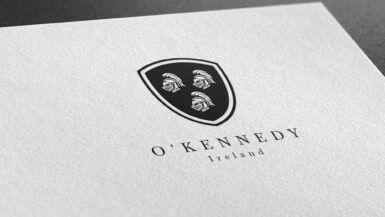Irish surnames have a long and fascinating history, with roots that stretch back over a thousand years. In this comprehensive guide, we will delve deep into the origins and meanings of the three most common Irish surname prefixes: O’, Mac, and Mc. Understanding these prefixes can help you unlock the stories behind your Irish ancestry and learn more about your family’s rich heritage.
The O’ Prefix: Descendants of a Noble Ancestor
The O’ prefix in Irish surnames is derived from the Gaelic word “Ó,” which means “descendant of” or “grandson of.” This prefix was traditionally used to indicate that the person was a descendant of a noble ancestor. For example, the surname O’Brien is derived from “Ó Briain,” which means “descendant of Brian,” a reference to the legendary Irish king Brian Boru.
The historical origins of the O’ prefix
The O’ prefix in Irish surnames can be traced back to the early days of the Gaelic language and has been in use for over a thousand years. The use of the O’ prefix began as a way to establish lineage, particularly among the ruling classes and noble families. By identifying themselves as descendants of a prominent ancestor, people could solidify their claim to power and prestige within their community.
Notable Irish families with the O’ prefix
Some of the most prominent Irish families with the O’ prefix include:
- O’Brien (Ó Briain): As mentioned earlier, the O’Brien family traces its lineage back to the legendary Irish king Brian Boru. The O’Briens were once the rulers of the Kingdom of Munster and played a significant role in Irish history.
- O’Neill (Ó Néill): The O’Neill family is another well-known Irish clan, originating from the northern province of Ulster. Their name is derived from the Gaelic name “Niall,” meaning “champion.” The O’Neills were once the High Kings of Ireland and have a long and storied history of power and influence.
- O’Connor (Ó Conchobhair): The O’Connor family hails from the province of Connacht and traces its roots back to the ancient Irish king Conchobar mac Nessa. The O’Connors were once the Kings of Connacht and played a crucial role in the struggle for control over Ireland during the medieval period.
The impact of the O’ prefix on Irish society and politics
The use of the O’ prefix in Irish surnames had a significant impact on the social and political landscape of Ireland. By claiming descent from a noble ancestor, families with the O’ prefix were able to establish themselves as leaders and power brokers within their communities.
In medieval Ireland, political power was often tied to one’s lineage, and the O’ prefix served as a badge of honor and prestige. As a result, families with the O’ prefix often held positions of power and influence, shaping the course of Irish history through their actions and decisions.
The role of the O’ prefix in preserving Irish history and culture
The O’ prefix also played an essential role in preserving Irish history and culture. By maintaining a connection to their noble ancestors, families with the O’ prefix helped to keep the stories and traditions of ancient Ireland alive. In many cases, these families also served as custodians of the Gaelic language and culture, resisting the encroachment of foreign influences and ensuring that the Irish way of life was preserved for future generations.
In conclusion, the O’ prefix in Irish surnames serves as a window into the rich history and culture of Ireland. By understanding the origins and meanings of these prefixes, we can unlock the stories of our ancestors and gain a deeper appreciation for the unique heritage that makes up the Irish identity.
The Mac and Mc Prefixes: The Son of a Proud Lineage
The Mac and Mc prefixes in Irish surnames both mean “son of” and come from the Gaelic word “Mac,” which is a patronymic prefix. These prefixes were commonly used to indicate a person’s lineage, showing that they were the son of a particular individual. For example, the surname MacCarthy means “son of Carthach,” an ancient Irish king.
The origins of the Mac and Mc prefixes
The Mac and Mc prefixes in Irish surnames have their origins in the Gaelic language, with both deriving from the word “Mac,” which means “son of.” The use of patronymic prefixes, such as Mac and Mc, was a common practice in early Irish society, as it helped establish lineage and familial connections. By identifying themselves as the son of a particular individual, people could assert their place within the social hierarchy and establish their ties to prominent families or figures.
The differences between Mac and Mc and the reasons for their variations
While both Mac and Mc have the same meaning and origin, there are subtle differences between the two. The Mac prefix is more commonly used in surnames of Gaelic origin, while the Mc prefix is often associated with surnames of Scottish origin. However, it is essential to note that there has been significant overlap and interchangeability between the two prefixes throughout history.
The primary reason for the variations between Mac and Mc is linguistic. The Mc prefix is an abbreviated form of Mac, resulting from the contraction of the Gaelic word over time. The differences in spelling can also be attributed to regional variations in pronunciation and the influence of the English language on Irish and Scottish surnames.
Notable Irish families with the Mac and Mc prefixes
Some well-known Irish families with the Mac and Mc prefixes include:
- MacCarthy (Mac Cárthaigh): The MacCarthy family originated in the province of Munster and was one of the most powerful dynasties in medieval Ireland. The name MacCarthy is derived from the Gaelic name “Cárthach,” meaning “loving.” The MacCarthy family played a significant role in the political landscape of Munster and Ireland as a whole.
- MacMahon (Mac Mathúna): Hailing from the northern province of Ulster, the MacMahon family traces its roots back to the ancient Gaelic chieftain Mathghamhain. The MacMahon family was once the rulers of the Kingdom of Oriel, which encompassed parts of modern-day Ulster and Leinster.
- McLaughlin (Mac Lochlainn): The McLaughlin family is another notable Irish clan from the province of Ulster. The name McLaughlin comes from the Gaelic name “Lochlainn,” which means “of the fjords” or “Viking.” The McLaughlin family were once the rulers of the Kingdom of Aileach, a powerful and influential political entity in early Irish history.
The impact of the Mac and Mc prefixes on Irish society and politics
The Mac and Mc prefixes played a significant role in Irish society and politics, much like the O’ prefix. By establishing lineage through the use of these prefixes, families could assert their place within the social and political landscape of Ireland. In many cases, families with the Mac and Mc prefixes held positions of power and influence, shaping the course of Irish history through their actions and decisions.
Furthermore, the Mac and Mc prefixes also served to emphasize the shared cultural and linguistic ties between Ireland and Scotland. As a result, the use of these prefixes helped to strengthen the bonds between the two Celtic nations and played a crucial role in the development of the broader Gaelic cultural identity.
The Evolution of Irish Surnames
The origins of Irish surnames and their early forms
The history of Irish surnames can be traced back to the early medieval period when Ireland was divided into numerous kingdoms, each ruled by a Gaelic chieftain or king. Early Irish surnames were predominantly patronymic, meaning they were derived from the name of an individual’s father or a prominent ancestor. This practice allowed for the identification of familial connections and the establishment of a person’s place within society.
In addition to patronymic surnames, some early Irish surnames were also based on occupations, physical characteristics, or geographic locations. However, these types of surnames were far less common than patronymic names and typically only gained prominence after the Norman invasion of Ireland in the 12th century.
The influence of the English language and Norman invasion on Irish surnames
The arrival of the Normans in Ireland in 1169 had a profound impact on the evolution of Irish surnames. As the Normans began to establish themselves in Ireland, they brought with them their own naming conventions and linguistic traditions. This led to the introduction of new surnames, many of which were based on occupations, locations, or physical attributes.
The influence of the English language also played a significant role in the transformation of Irish surnames. As English became the dominant language of administration and commerce in Ireland, many Gaelic surnames were anglicized to facilitate communication and integration into the new social order. This process often involved simplifying the pronunciation and spelling of Gaelic names or translating them into their English equivalents.
The impact of the Gaelic Revival on the preservation of Irish surnames
The Gaelic Revival, a cultural movement that began in the late 19th century, sought to reinvigorate the Irish language and promote Irish cultural identity. One of the movement’s key objectives was the preservation of traditional Irish surnames, many of which had been anglicized or altered over the centuries.
As part of this effort, many Irish people began to revert to the original Gaelic forms of their surnames, incorporating the O’, Mac, and Mc prefixes as appropriate. This process helped to restore the historical and cultural significance of these names and reaffirmed the importance of the Irish language and heritage.
The effects of emigration and globalization on Irish surnames
The mass emigration of Irish people throughout the 19th and 20th centuries, driven by factors such as famine, economic hardship, and political unrest, had a profound impact on the evolution of Irish surnames. As Irish people settled in new countries, their surnames were often altered or anglicized to fit in with their new surroundings. This process led to further changes in the spelling and pronunciation of Irish surnames, as well as the introduction of new names derived from Irish originals.
In the modern era, globalization has further contributed to the evolution of Irish surnames, as people of Irish descent continue to travel, work, and live in different parts of the world. This ongoing process of cultural exchange and adaptation ensures that Irish surnames will continue to evolve and adapt, reflecting the rich and diverse history of the Irish people.
The Importance of Irish Surname Prefixes in Genealogy
The role of Irish surname prefixes in identifying family connections
Understanding Irish surname prefixes, such as O’, Mac, and Mc, can be invaluable when researching your family history. These prefixes provide important clues about your ancestors’ lineage and their connections to prominent families or figures within Irish society. By examining the meanings and origins of these prefixes, you can uncover the stories behind your Irish ancestors and gain a deeper understanding of your family’s heritage.
In many cases, the use of a specific prefix can help you identify potential relatives or trace your ancestors back to a particular region of Ireland. For example, if your surname has the O’ prefix, you may be able to establish a connection to a noble Irish family, while surnames with the Mac or Mc prefix may indicate ties to a specific Gaelic chieftain or king.
The significance of regional variations in Irish surnames
Regional variations in Irish surnames can also provide important information about your family’s history. Different regions of Ireland have distinct naming conventions and linguistic influences, which can be reflected in the spelling and pronunciation of surnames. By examining these regional variations, you can gain insights into the geographic origins of your ancestors and potentially trace your family’s migration patterns over time.
For example, certain surnames are more commonly associated with specific provinces or counties in Ireland. Surnames with the O’ prefix are often linked to Munster and Connacht, while those with the Mac and Mc prefixes are more common in Ulster. By understanding these regional associations, you can narrow down the scope of your genealogical research and focus on the areas most likely to yield valuable information about your ancestors.
The challenges of tracing Irish ancestry through surnames
While Irish surname prefixes can provide crucial insights into your family’s history, tracing your Irish ancestry through surnames alone can be challenging. Factors such as the anglicization of Irish names, the effects of emigration, and the loss or destruction of historical records can make it difficult to establish definitive connections between your ancestors and their Irish roots.
Despite these challenges, understanding the meanings and history of Irish surname prefixes can be an invaluable starting point in your genealogical research. By examining the stories behind these prefixes and their regional variations, you can begin to piece together the puzzle of your Irish ancestry and uncover the rich heritage that lies hidden within your family’s past.






Leave a reply